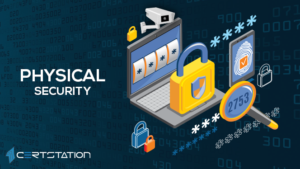Introduction: Demystifying the Importance of Sound Physical Security
Imagine facing an eerie silence within your workplace on a weekend and then witnessing your laptop vanish into thin air. Or think of feeling violated when private information on your computer is shared without your consent. Such incidents highlight the significance of physical security, an often-overlooked aspect of our digital world.

Image: certstation.com
Physical security entails safeguarding physical assets, such as equipment, inventory, and facilities, from unauthorized access, use, or destruction. It’s the cornerstone of protecting valuable resources, creating secure work environments, and ensuring business continuity.
Defining the Components of Effective Physical Security
1. Access Control
Controlling access to physical espaces and assets is crucial. This can be achieved through locks, security guards, electronic access systems, biometric verification, etc., ensuring only authorized individuals enter restricted areas.
2. Surveillance
Monitoring spaces and activities using CCTV cameras, motion sensors, alarms, etc., provides real-time visibility. With surveillance, security personnel can detect suspicious behavior, deter unauthorized entry, and swiftly respond to incidents.

Image: www.coursehero.com
3. Environmental Security
Adequately controlling environmental factors like temperature, humidity, fire, and power ensures optimal conditions for equipment and facilities. These measures safeguard assets from damage and prevent disruptions caused by environmental hazards.
4. Perimeter Security
Protecting the physical boundaries of a facility involves erecting fences, installing gates, and patrolling perimeters. Perimeter security restricts unauthorized entry, prevents theft, and maintains the integrity of the workplace or building.
5. Security Procedures and Training
Establishing explicit security protocols and providing regular training to employees and security personnel is essential. By doing so, organizations ensure everyone comprehends their roles and responsibilities, enhancing overall security awareness.
Understanding the Latest Trends and Developments
In the realm of physical security, technological advancements are constantly emerging. Some key trends include:
- Integration of IoT (Internet of Things) devices for remote monitoring and automated alerts.
- Increased use of artificial intelligence (AI) for real-time threat detection and analysis.
- Embracing cloud-based security solutions for centralized management and scalability.
Expert Tips for Enhancing Physical Security
- Conduct regular risk assessments: Evaluate the potential threats and vulnerabilities associated with your assets and implement countermeasures accordingly.
- Implement layered security: Combine multiple security measures to create a holistic and robust protection system.
- Use smart technology: Leverage surveillance cameras with motion detection, access control systems with biometric authentication, and IoT sensors for automated monitoring.
- Educate employees: Regularly train staff on security procedures, potential threats, and reporting mechanisms.
- Invest in a security team: Engage the services of professional security personnel for proactive monitoring, incident response, and emergency management.
Frequently Asked Questions (FAQ)
- Q: Why is physical security important?
A: Physical security protects vital assets, ensures a safe work environment, and prevents unauthorized access to confidential information. - Q: What are the core components of a physical security program?
A: Access control, surveillance, environmental security, perimeter security, and security procedures form the foundation of a comprehensive physical security program. - Q: How do I enhance the physical security of my business?
A: Conduct risk assessments, implement layered security, use smart technology, educate employees, and consider engaging a security team.
Which Of The Following Best Describes Good Physical Security
https://youtube.com/watch?v=78ESL84uChc
Conclusion: Embracing the Importance of Physical Security
Physical security is not merely an afterthought; it’s a proactive measure that can save organizations from catastrophic consequences. By understanding the components, trends, and best practices of physical security, we can safeguard our assets, prevent incidents, and create a secure environment.
Are you interested in delving deeper into the fascinating realm of physical security? Explore additional resources, engage with security experts, and stay updated on emerging advancements to ensure the unwavering protection of your valuable assets.

